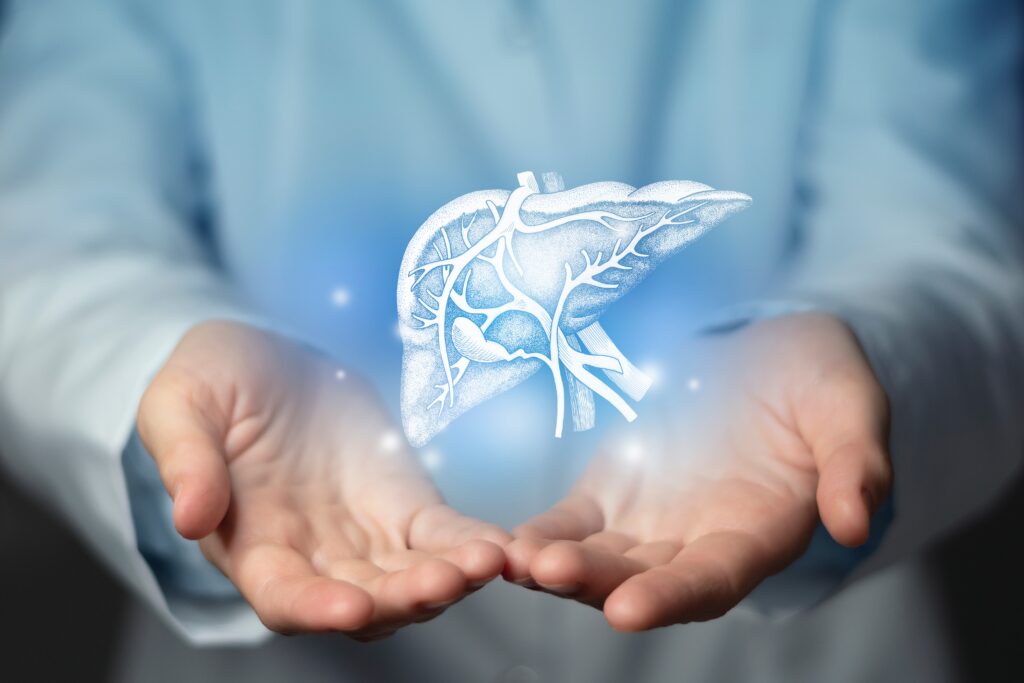Your liver is an important organ in your body and plays a vital role in your overall health.
However, it is also susceptible to certain issues, making early detection and diagnosis critical in ensuring treatments and healthy lifestyle changes can be as beneficial as possible.
In this blog post, we take a detailed look at the different conditions and factors that impact your liver and provide you with some top tips on how to keep it healthy.
What is the liver and what does it do?
Your liver is located in the upper-right side of your abdomen, below your diaphragm and above your stomach, right kidney and intestines. It has a unique dual blood supply which means it receives blood from both your hepatic artery and your portal vein.
Your liver has many different functions that are all critical for your wellbeing. Firstly, it is responsible for processing nutrients from the food you eat, including carbohydrates, fat and protein, and converting them into energy.
Another function of the liver is detoxification – filtering out harmful substances and trying to stop them from harming the rest of your body. It also stores certain vitamins and minerals, releasing them into your bloodstream to support your overall health when required.
Finally, the liver is also responsible for producing and secreting bile – a digestive fluid that is used to break down fats.
Therefore, whichever foods or substances you put into your body will be processed by the liver. That’s why it’s so important to be conscious of your lifestyle and dietary choices.
Common liver problems and conditions
Although your liver is good at filtering out toxins and harmful substances, that doesn’t mean it’s immune to health problems.
Some of the conditions and problems that can affect your liver include:
- Non-alcoholic fatty liver disease (NAFLD) – this is where an excessive amount of fat accumulates in the liver that’s unrelated to alcohol consumption.
- Viral hepatitis – this refers to inflammation of the liver most commonly caused by viral infections. Untreated or chronic hepatitis can lead to permanent liver damage.
- Cirrhosis – scarring (fibrosis) of your liver can be caused by different types of liver conditions such as hepatitis and alcoholism.
- Liver cancer – cancer can develop in your liver and spread to the other organs within your body. Some people may have a higher risk of this disease than others.
- Liver failure – this is where your liver completely loses its ability to function. Liver failure can be acute (sudden) or chronic (developing gradually over an extended period of time).
Causes of liver problems
There are many different reasons why liver problems develop. While some of them are avoidable, others are down to unchangeable factors such as genetics.
The cause behind a specific liver problem will also depend on the type of liver problem it is and the condition you have.
The causes of NAFLD can be obesity, insulin resistance and high cholesterol, for instance, whereas cirrhosis can sometimes be the result of NAFLD as well as high alcohol consumption and certain genetic disorders.
Viral hepatitis is passed on through contaminated items such as food, water, blood or other bodily fluids. Therefore, hepatitis can be caught by having unprotected sex, sharing needles or through mother-to-child transmission.
While there isn’t a specific cause for liver cancer, you may be at a higher risk of it developing if you already have liver conditions such as cirrhosis, chronic hepatitis or consume alcohol excessively.
Liver failure can also be caused by viral infections, autoimmune diseases, genetic conditions and medication-induced liver injury.
Not all causes of liver problems can be avoided, but you may be able to reduce your risk of them developing by keeping your liver healthy.
How to keep your liver healthy
With so many important functions, maintaining the health of your liver for as long as possible is essential. However, modern lifestyles or addictions can take a toll on your liver health and put you at a higher risk of certain conditions.
Being proactive with your approach to healthcare and making changes to your lifestyle is the best way to keep your liver healthy. Detailed below are some effective methods you can use to enhance and protect your liver health.
Reduce or limit alcohol consumption
Many people drink alcohol, but a lot of people drink more than is healthy for their bodies. Understanding what a unit of alcohol looks like and how many you drink regularly can make a big difference to your liver health.
One unit of alcohol, around 10 ml of pure alcohol, is how much an average adult can physically process within one hour. This means that if you drank one unit of alcohol, after one hour, there should be little to no alcohol left in your blood.
The recommended amount of units varies from person to person and is dependent on various factors, such as:
- Your biological sex
- Your height
- Your weight
The general rule is that neither men nor women should drink more than 14 units of alcohol in one week. It’s also advisable to spread your drinking out over three or more days if you do drink up to or over 14 units per week. Drinking high volumes in shorter spaces of time can also cause more damage as your liver cannot process it all at once.
By cutting down or limiting your alcohol consumption, you can reduce your risk of liver problems drastically.
Luckily, most bottles or cans of alcohol state how many units are in them. But if you are ever unsure, there is a UK unit calculator which can help you be certain of how many units you’re drinking.
Be hygiene aware
Hepatitis is a liver condition that can be avoided if you follow best hygiene practices. For example, always wash your hands after using the bathroom and be cautious when eating food you haven’t prepared yourself.
Needle sharing is a common way for hepatitis to spread. However, contrary to popular belief, this problem is not always associated with taking illegal drugs.
Needles are used in many legal practices such as piercing and tattooing, which is why it’s crucial to only ever go to reputable places. Needles should be single-use so if your piercer or tattoo artist does not take out a fresh needle for your procedure, do not go through with the appointment.
Practising safe sex also plays a big role in preventing hepatitis. Using condoms and other barrier methods such as dental dams is the only way to stop the transmission of hepatitis during sex.
Exercise
While you will probably know already that getting enough exercise each week is vital for your heart health, it’s also important for your liver.
Exercising regularly can help you maintain a healthy weight and improve insulin sensitivity, both of which can decrease your risk of type 2 diabetes. High blood sugar levels for extended periods cause damage to your liver, so reducing this risk is important.
Exercise can also reduce inflammation and encourage the body to use up fatty acids rather than store them. This can reduce your chances of developing NAFLD and other liver complications.
Foods for a healthy liver
Eating a balanced diet is a key part of leading a healthy lifestyle. But just as there are foods and drinks you should avoid, there are things you should try to eat and drink more of to promote a healthy liver.
Some foods and drinks you can incorporate more of into your diet include:
- Coffee – studies have shown that drinking coffee can potentially reduce the risk of cirrhosis and permanent liver damage in liver disease.
- Grapefruit – the antioxidants within grapefruit could reduce inflammation and damage.
- Blueberries and cranberries – these contain an antioxidant called anthocyanin and these can reduce inflammation and further damage in NAFLD.
- Cruciferous vegetables – these include foods like broccoli, Brussels sprouts, cabbage, kale and cauliflower. These vegetables are high in fibre and have specific compounds that change the detoxification process in the liver, potentially reducing the risk of NAFLD.
- Nuts – these are rich in nutrients such as healthy fats, antioxidants and vitamin E, all of which can contribute to better health. One study found that a diet higher in nuts decreased the risk of NAFLD.
- Fatty fish – omega-3 fatty acids can help to reduce inflammation and a 2016 study found that they lowered liver fat in people with NAFLD.
Taking care of your liver health is vital for your overall wellbeing and following these top lifestyle changes can make a big difference. With the right proactive healthcare and lifestyle adjustments, you can protect your liver health over the long term.
Book a preventative health assessment at Echelon Health
At Echelon Health, we believe in early detection and preventative healthcare. Our comprehensive health assessments provide you with peace of mind and the advice you need to lead a healthy lifestyle.
We offer a wide range of packages so you can find the diagnostics and testing to suit your specific needs and proactively look after your health.
Find out more by booking your health assessment with Echelon Health today.
Sources:
- https://www.hopkinsmedicine.org/health/conditions-and-diseases/liver-anatomy-and-functions
- https://www.healthline.com/nutrition/11-foods-for-your-liver
- https://britishlivertrust.org.uk/information-and-support/love-your-liver/looking-after-your-liver/
- https://liverfoundation.org/resource-center/blog/13-ways-to-a-healthy-liver/
- https://www.nhs.uk/live-well/alcohol-advice/calculating-alcohol-units/



